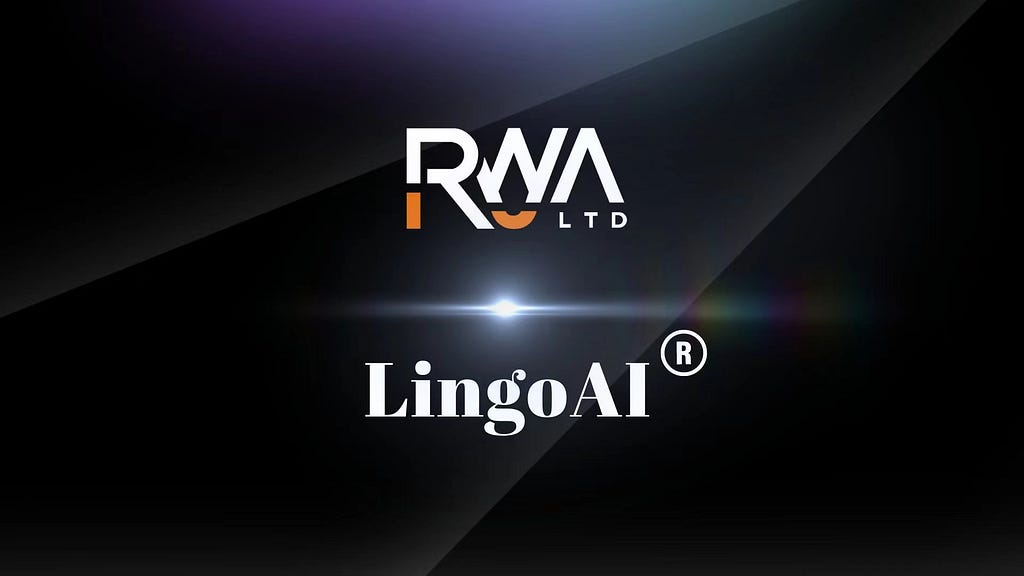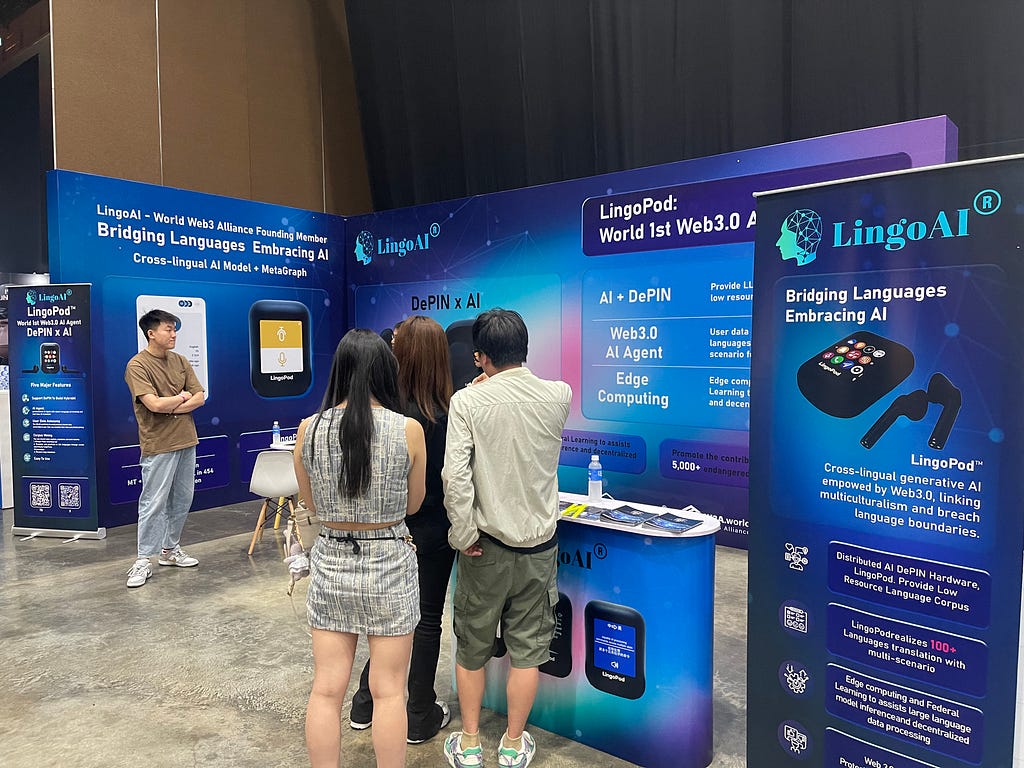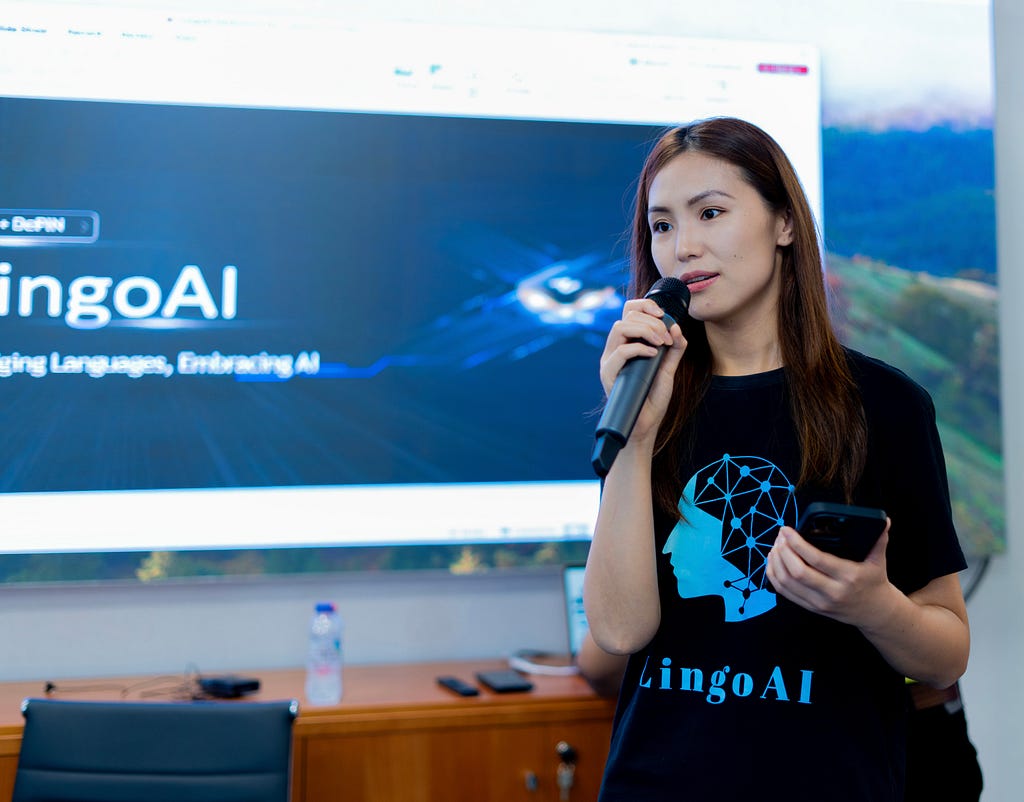Singapore’s Web3.0 artificial intelligence enterprise LingoAI and Hong Kong’s RWA.ltd have formally announced a strategic partnership. This collaboration will leverage both parties’ core strengths to combine DePIN with RWA to drive the development of artificial intelligence.
The geographical advantages of Hong Kong, as the world’s strongest DePIN power source place, and Singapore, as the best radiation source place in Asia, Africa, and Latin America, will kickstart the large-scale adoption of Web3.0.

Headquartered in Singapore, LingoAI focuses on decentralized artificial intelligence and cross-language AIGC. LingoAI has defined the world’s first Web3.0 AI Agent, LingoPod, which returns data ownership to users and protects their privacy through decentralized AI Agent technology. For users, LingoPod is not only a cross-lingual real-time translation device but also allows them to upload speech data and earn LINGO tokens as rewards, known as corpus mining. Thus, LingoPod can provide decentralized access to thousands of low-resource languages and dialects globally, contributing to the tuning and widespread application of large language models. Meanwhile, Hong Kong-based RWA.ltd is dedicated to the tokenization and circulation of Real World Assets (RWA). Key aspects of this collaboration include the innovation of RWA + DePIN + AI technology, market expansion for LingoPod products, and community. Both parties will explore new opportunities combining DePIN and RWA to promote the integration of traditional capital with digital technology.
DePIN (Decentralized Physical Infrastructure Networks) is an innovative concept that uses blockchain technology to decentralize the infrastructure, management, and operation of internet, communication, artificial intelligence, and energy infrastructures. Traditional physical infrastructure projects have been centrally and top-down managed by giant corporations, which is costly and stifles innovation. DePIN networks enhance transparency and security through decentralized management, share costs and risks through a shared economy model, optimize resource use, and provide higher quality services to better meet market demands, creating an open, competitive, and innovative environment. According to SmartMesh founder, Henry Wang, DePIN allows everyone to become a distributed operator.
RWA refers to “Real World Assets,” a concept primarily used in blockchain and decentralized finance (DeFi). DePIN is also a type of RWA, but unlike traditional RWAs, its value can grow significantly due to network effects. Traditional RWAs, such as real estate, bonds, and stocks, have limited value growth when they are tokenized. However, DePIN represents infrastructure with network effects, creating regional or global platforms with extensive application potential and high market expectations.
When combing LingoPod’s DePIN and RWA, distributed artificial intelligence infrastructure devices can be transformed into digital assets through tokenization, traded and managed on the blockchain while maintaining a connection with physical infrastructure in the real world. Each LingoPod comes with an NFT that can be composed or fragmented and then managed and operated through the DePIN model.
In LingoAI’s DePIN network, LingoPods and future LingoGlass can be represented on-chain as NFTs or based on their geographical location, device type, uptime, large language models, or neural networks, among other data forms. Each device is associated with specific data, which may be related to cross-lingual translation and corpus or other data from the user’s AI agent. These data can also be linked to RWA through on-chain digital twins and can be analyzed and published under the protection of user privacy using edge computing or federated learning.

DePIN is shifting the focus in the RWA field from highly liquid, intangible assets to relatively illiquid physical assets like LingoPods, MeshBox, and Wi-Fi routers, which can benefit more fully from their on-chain identities. As the next stage in the evolution of RWA, the DePIN project creates a physical infrastructure network composed of real-world devices, tokenizing these devices to form a complete token economy. This token economy is bilateral. On the supply side of the LingoPod DePIN project, contributors use LingoPods to provide low-resource language corpus and dialect data for AI. In return, contributors receive token incentives and have a degree of governance in the distributed artificial intelligence network.
On the demand side of the LingoPod DePIN project, users pay LingoAI for its services either with LINGO tokens or more commonly (for governments and enterprises) with fiat currency. One option is to purchase and burn the corresponding LINGO tokens in the project, accumulating the economic value of the transaction to the total value of the project tokens, ultimately benefiting LingoAI’s contributors and token holders.
Suppose a group of investors from developed countries wants to jointly fund the purchase and deployment of LingoPods. As the hardware is represented as NFTs on the blockchain, they can be bought or sold at any time without permission, while the physical LingoPod devices are shipped individually to developing countries or low-resource language regions. People in developing countries, who generally have lower incomes, can receive LingoPods for free after KYC through the United Nations, the Asian Development Bank, or other agencies, contributing corpus and earning income. LingoAI helps build a global language dataset in the process, also aiding people in underdeveloped regions. RWA binds the internal private keys of LingoPod devices with the physical devices. Token rewards accumulate on the NFT bound to the LingoPod device and can be freely exchanged in the decentralized social network MetaLife.Social’s wallet and the NFT market Open Galaxy.
Given multiple owners, the NFT can be split, allowing multiple investors to fund the purchase and deployment of LingoPods, then distribute the Lingo token rewards from the devices according to their contributions to the deployment. Through a simple multi-signature wallet, investors do not need to use centralized custody services and reduce legal fees associated with the trustless and permissionless nature of blockchain technology. Finally, investors do not even have to fully understand or trust each other, as all on-chain activities related to the device (including ownership, uptime, location, usage, and revenue) are transparent and immutable.

LingoAI founder and CEO Una Wang stated that LingoAI’s first step is to use DePIN to address the global issue of low-resource language corpus. The current centralized approach is costly and slow, which hampers the evolution of AI models, like building the Tower of Babel. LingoAI aims to complete this epic task in the shortest possible time by building the LingoPod decentralized physical AI infrastructure network using the Web3.0 approach. The collaboration with RWA.ltd will significantly accelerate the global deployment of the LingoPod DePIN network.

RWA.ltd co-founder Tony noted that the real-time translation capabilities of LingoPod greatly assist traditional international trade clients with their multinational businesses, making it a boon for clients. Meanwhile, RWA allows the separation of ownership and usage rights of LingoPod devices, not only solving the issue of small investments in the equipment but also easing the hassle for an investor wishing to invest heavily in hundreds of LingoPods. These devices can be distributed to people in developing countries who speak low-resource languages by RWA.ltd and other agencies or organizations, making full use of the equipment and sharing the benefits based on contributions. This financial innovation allows people from developed countries to participate in building artificial intelligence infrastructure in developing countries, sharing the economic benefits of rapid economic growth in developing countries. This unique and imaginative Token Flow and the logic of financial transactions between the virtual and real world bring vast development space and narrative to the Web3.0 and cryptocurrency markets.
During BitcoinAsia, at the “DePIN Mass Adoption Moment” event recently held in Hong Kong, Henry Wang pointed out that Web3.0 and DePIN will not be first massively adopted in developed countries like China and the US but will start from the periphery to the center, beginning in regions like Southeast Asia, Africa, and Latin America. Singapore is an important node for Web3.0 radiation in Southeast Asia. One advantage of Hong Kong is its position in the Greater Bay Area of Guangdong-Hong Kong-Macao. On the one hand, Hong Kong can use its financial and regulatory advantages, and on the other hand, it can rely on the technical and equipment manufacturing strengths of places like Shenzhen, helping Hong Kong’s DePIN to develop rapidly.
“In the 1980s, Hong Kong served as the ‘front store, back factory’ for the goods economy and transhipment trade of physical goods. Now, Hong Kong can become the ‘front store, back factory’ for the digital economy and the ‘transhipment trade’ of digital goods,” said Xiao Feng, the initiator of ThreeDAO.
The partnership between Singapore’s artificial intelligence enterprise LingoAI and Hong Kong’s real-world asset company RWA.ltd marks a breakthrough expansion in their respective fields, heralding strategic synergistic layouts in the global market by both companies. Through this collaboration, both parties will explore new opportunities combining DePIN and RWA, promoting the integration of traditional capital with digital technology, empowering global artificial intelligence development, and making AI more decentralized, democratic, and sustainable, providing richer and more convenient services for users. This collaboration also addresses the unemployment issues AI brings and brings Universal Basic Income (UBI) to everyone in need.
About LingoAI
Headquartered in Singapore, LingoAI has defined the first Web3.0 AI Agent (Web3.0 AI Agent), launched the LingoPod real-time translation device, which can build an AI x DePIN network to help solve the problem of insufficient low-resource language corpus required by AI. LingoPod allows for more personalized inference in individual AI models while protecting user data privacy. Moreover, LingoAI has innovatively integrated the Web3.0 and AI MetaGraph technology protocol stack from the ground up. MetaGraph allows the large language model to combine with the knowledge graph RAG, ensuring that large language models can avoid generating hallucinations. LingoAI uses the fundamental semantic web through the SOLID and MetaLife.Social protocols to achieve data and application separation, aiming to form a global decentralized data trading market to solve the data shortage issue caused by Web2.0 data silos. This realizes the Web3.0 A Web of Data vision.
About RWA.ltd
RWA.ltd is an innovative enterprise based in Hong Kong, committed to digitizing real-world assets through tokenization for global issuance and circulation, aiming to transform traditional asset investors into digital asset investors through innovative chains and platforms, expanding investment channels and market scope.
